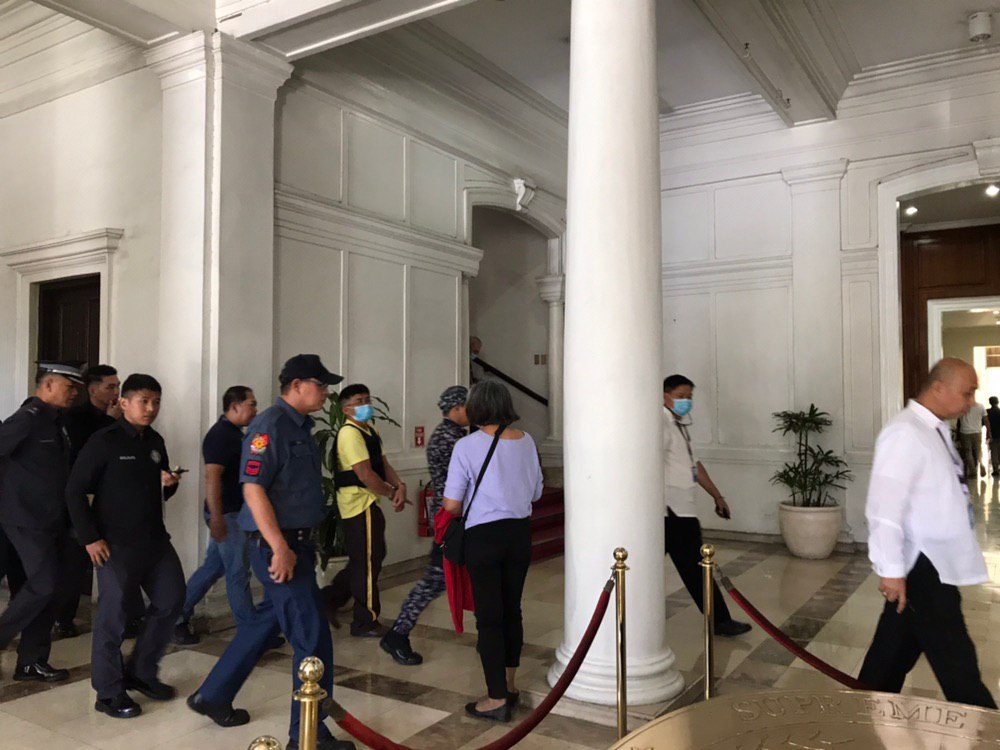SUMMARY
This is AI generated summarization, which may have errors. For context, always refer to the full article.

MANILA, Philippines – Can the doctrine set by the Supreme Court in granting bail on humanitarian grounds be applied to an elderly former communist rebel who is accused of massacre?
This was raised on Thursday, March 12, during the Supreme Court oral arguments on the petition for writ of habeas corpus to free former Communist Party of the Philippines (CPP) chairman and New People’s Army (NPA) chief Rodolfo Salas, more popularly known as Kumander Bilog.
He is 72.
“Would you not consider availing of the doctrine in Enrile?” Associate Justice Alexander Gesmundo asked Salas’ lawyer Arno Sanidad of the Free Legal Assistance Group (FLAG).
The doctrine refers to the 2015 decision of the Supreme Court, where the justices voted 8-4 to grant former senator Juan Ponce Enrile bail due to humanitarian grounds. Enrile was 91 at the time he was jailed for plunder over the pork barrel scam.
Former first lady Imelda Marcos was also able to use the Enrile doctrine to her advantage, as the Sandiganbayan allowed her to enjoy post-conviction bail because of old age.
“That is one we would like to ask too your honor. But basically considering that the closest basis for his bail would be the very case of Ocampo… [and] this Honorable Court granted bail to Ocampo,” said Sanidad.
Sanidad was referring to former Bayan Muna representative Satur Ocampo, who was also charged alongside Salas over the 2006 discovery of a mass grave in Inopacan, Leyte, where supposed victims of an alleged purge of communists were buried. The case has been pending for 12 years.
In September 2019, a court ordered Salas arrested over this crime, as the government intensified its crackdown on the Left. He was captured last February 18 in Angeles City.
Asked whether he would object if ever Salas invoked the Enrile humanitarian grounds doctrine, Solicitor General Jose Calida told Gesmundo: “I will cross the bridge when I see it.”
Associate Justice Rosmari Carandang repeated the question when it was her turn to interpellate.
“It is up to this court to decide if he should be given bail, but if you read our sentiments, how about the 15 who were massacred? How about their relatives? They have waited for justice for so long. There should be balancing here of sentiments,” Calida said.
Political offense doctrine
Ocampo was granted bail by the Supreme Court in 2007 after arguing that the alleged Leyte massacre is covered by the crime of rebellion, citing the political offense doctrine.
Political offense doctrine states that crimes like murder, if committed in furtherance of the rebellion, should be absorbed by the crime of rebellion.
It is Sanidad’s and FLAG’s position that like Ocampo, Salas must also be protected by that doctrine.
Salas had already served time for rebellion after his arrest in 1987. In 1991, he struck a compromise agreement with the Cory Aquino government, which protected him from prosecution of “any common crime allegedly committed in furtherance of rebellion or subversion.” He was released in 1992.
FLAG said the Leyte murders fall under the “any common crime” that Salas is protected from.
Associate Justice Marvic Leonen pointed out later the dissents in the Enrile decision, saying there was a dissenting opinion that cast doubt on Enrile’s health conditions.
“There was a strong dissent, a very cogent dissent,” said Leonen, referring to his own dissenting opinion.
In that opinion, Leonen wrote: “Until the end of [Enrile’s] term on June 30, 2016, he actively and publicly participated in the affairs of the Senate.The majority maintains that his release on humanitarian grounds due to his frail health still stands.” This is a contradiction I cannot accept.”
“This court can take public knowledge and judicial notice how cramped the Manila City jail is, he’s placed now in a 3 by 1 and a half foot bed, with 3 or 4 others beside him,” said Sanidad.
The oral arguments finished past 12pm. Parties must submit memoranda within a non-extendible period of 5 days after which the decision is submitted for decision.
Salas is scheduled to be arraigned before the Manila Regional Trial Court on March 17. – Rappler.com
Add a comment
How does this make you feel?
There are no comments yet. Add your comment to start the conversation.